Clifford Garstang's Blog, page 112
January 7, 2012
Year of the LitMag: Mid-American Review Vol. XXI No. 2
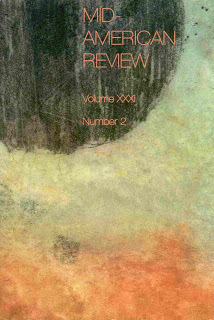
[Note: this post is part of my Year of the LitMag series. If you would like to contribute to the series, please leave a comment below or send me an email. CG]
I've read other issues of the Mid-AmericanReview out of Bowling Green State University, but with the new issue,Volume XXI No. 2, I am reminded that the editors seem to like quirky, off-beatstories. There are lots of examples here.
Matthew Eck's "The Many Inventions of Walt Whitman, Jr." isa love story, sort of, about a guy who goes out on a date with a wrong number,but he wears a sheet because she tells him it's a philosophy party (and he'sthinking "toga"). The dialogue is witty and fast-paced, and reveals thedelightfully twisted character of the narrator. Shannon Cain's "I Love Bob" isabout Hillary, whose mother, a drunk, has told her that Bob Barker is herfather. So Hillary goes to Hollywood and meets Bob Barker. Lydia Fitzpatrick's "FloodLines," which won the Sherwood Anderson Fiction Award, is told in the thirdperson plural from the point of view of Catholic school girls who weredisplaced by Katrina but are now back, all but one. Kate Finlinson's "Transliteration,"a fragmented piece, is about a widow who is carrying on a conversation with herlate husband—inRussian. Matt Mullins's "The Braid" is without quirks, but it does have quite ashock built into it. Mark Mayer's "The Evasive Magnolio" is about dealing withthe corpse of an elephant. (It's about way more than that, actually.) There arealso a number of excellent flash fictions in this issue, including Ravi Mangla's"Better Halves," and one that I resisted (but ultimately liked) because it's insecond person, "Divination" by James Tadd Adcox.
On top of the fiction, there are three essays and a lot ofpoetry, including an interesting translation chapbook called "Beneath anAvalanche of Waking" by Mira Kus, translated by Karen Kovacik.
And then, at the back of the issue, I was reminded thatMid-American Review runs reviews. Lots of reviews. In a section called "What We'reReading" there are 22 book reviews, including reviews of books from a lot ofsmall presses: Ryan Call's WeatherStations (Caketrain Press); Heather Fowler's Suspended Heart (Aqueous Books); Seth Fried's The Great Frustration (Soft Skull Press); Michael Hemmington's Pictures of Houses with Water Damage(Black Lawrence Press); and lots more.
I wanted to mention, too, that MAR design is great. For this issue, the beautiful cover art is by Nikkita Cohoon.
Published on January 07, 2012 07:13
January 6, 2012
Prime Number Magazine: Editors' Selections Vol. 1
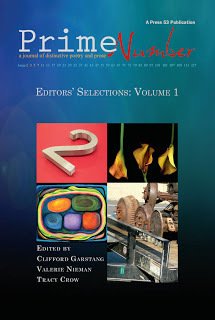 I am very excited to announce that Volume 1 of the Prime Number Magazine Editors' Selections is available for order.
I am very excited to announce that Volume 1 of the Prime Number Magazine Editors' Selections is available for order.Prime Number Magazine debuted in July 2010 with Issue 2 (we use prime numbers for our online issues, and the next issue our 8th, is No. 17 and will go live in 2 weeks). We published a lot of terrific work over the course of the first year, and this print annual volume includes only a small portion of it.
The book includes nonfiction by Maris Venia, Stephen J. West, and Faye Rapoport DesPres; fiction by Kevin Wilson, Scott Loring Sanders, Susan Tepper, Anne Leigh Parrish, Jon Trobaugh, Richard Wiley, Meagan Ciesla, Dennis Ginoza, Virginia Pye, John Flynn, Dan Moreau, Daniel Meltzer, Linda Stewart-Oaten, Paul Hetzler, and David Meischen; and poetry by James Harms, Sarah Lindsay, Jake Adam York, Susan Laughter Meyers, Mark Smith-Soto, Lola Haskins, Timothy Black, Robert Hill Long, Theodore Worozbyt, Rachel Hadas, Erica Dawson, Barry Spacks, Ruth Foley, Emilie Lindeman, Catherine Staples, M.A. Schaffner, and William Reichard.
Published on January 06, 2012 12:36
Sign up now for "Writing the Short Story: Make Your Story Great!"
 There are a few spaces left in my online class "Writing the Short Story: Make Your Story Great!," which begins on January 16 on Writers.com.
There are a few spaces left in my online class "Writing the Short Story: Make Your Story Great!," which begins on January 16 on Writers.com.This class is a hybrid lecture/workshop class. Each week we will discuss (in an online forum) various aspects of writing the short story. We'll also read famous examples that illustrate the topic under discussion, and we'll do writing exercises that we'll share with the group. But also, every student in the class will have a short story critiqued by the whole class in much the same way that we'd do it in a face-to-face workshop.
The class is always fun and we have excellent discussions. To get more information on what we'll cover in the class and how to sign up, go here.
Published on January 06, 2012 11:08
Tips for Writers: Read
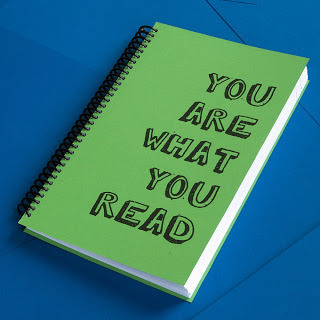
You are what you read. When I started my MFA program,someone offered this bit of advice: "Read good stuff." If you want to be agreat writer, read great writers. The expectation is that experiencing goodwork on the page will help as you try to generate your own work. You'll see howsentences are formed, how language can be used, what craft techniques areeffective, etc. And if you're reading modern greats, you'll also see whatcritics and readers are responding to these days, what publishers are buying,and what's already been done.
A corollary to this advice is "Don't read bad stuff," and Ithink it's equally valuable. I think the problem with bad writing, for abeginning or emerging writer, is that it gives you the wrong impression. DanBrown isn't successful because he writes great sentences, for example, andanyone who tries to imitate his writing is doomed. Read Brown for plot, maybe.Likewise for Grisham and some others. But try to ignore the writing while you'redoing it.
But I suppose there's another corollary: "Read what you wantto write." Not that anyone intentionally wants to write bad stuff, but if youwant to write fantasy, you should read fantasy. If you want to write thrillers,read thrillers. The reason I write mostly literary fiction is because I readmostly literary fiction. I sometimes worry that taking my reading across genreswill be bad for my writing. And it might be, if I'm not careful.
More than ever, lately everything I read feels likesomething I can learn from. I just finished Alice Hoffman's The Probable Future (an audiobook,listening in the car), and while her style is definitely not something I'llimitate (a bit flowery for me), and I rarely use an omniscient voice, I didfeel that she drilled pretty deep into her character's feelings, and that'ssomething I could do better. I also recently read Ellen Meister's The Other Life, and I was payingattention to point of view there, as well.
But there's another aspect of learning, and that'sunderstanding the market. I'm reading the latest issue of Mid-American Review. I know the editors there and I've submitted afew times, but I've never had anything accepted. I've read the magazine before,I think this time I finally understand why my stuff hasn't worked there. But itreinforces the notion for me that if you're going to submit to a magazine, readthat magazine first to get a sense of what they're looking for. It's key.
By the way, you can order a copy of the blank journal onEtsy, which is where I found the picture: YouAre What You Read Journal.
Published on January 06, 2012 10:21
January 2, 2012
The New Yorker: "Expectations" by John Lanchester
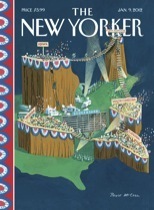 January 9, 2012: "Expectations"by John Lanchester
January 9, 2012: "Expectations"by John LanchesterThis appears to be an excerpt from Lanchester's forthcomingnovel called Capital, which the excerpt is all about. It's an amusing readbecause the main characters are comically obnoxious, but that's about all ithas going for it.
Roger is an investment banker in London, and he'santicipating a year-end bonus of a million pounds. Maybe more! After all, thedepartment he manages, foreign exchange, made a bundle for the bank during theyear. And although other parts of the bank didn't do so well, Roger has earnedhis bonus! And he needs that bonus, too, because he and his wife are a bit overextended on the posh house that they did an extensive remodel on and thecountry place (and the cars and servants, etc., etc.). And then there's thewife, who, despite the cars and the servants, thinks Roger doesn't understandhow hard she works to raise their boys (there are nannies), and so she plots tosend him a very strong message.
John is surprised by his bonus, but not terribly surprisedby the message his wife sends . . .
It'spretty hard to care about these people in the context of this excerpt, butmaybe they'd be more likeable in the novel.
Published on January 02, 2012 16:14
It was a very good year.
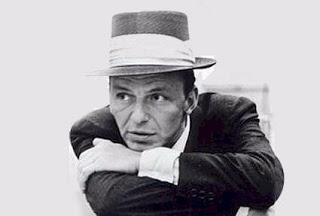 All in all, 2011 turned out to be a pretty good year. It didn't begin with much promise. My agent had still not managed to sell my novel in stories, and I was struggling with the manuscript of a new novel, unsure of what would become of it. I was studying French (that was fun, at least), but was turned down for a residency in France. I was working hard, but nothing seemed to be going right.
All in all, 2011 turned out to be a pretty good year. It didn't begin with much promise. My agent had still not managed to sell my novel in stories, and I was struggling with the manuscript of a new novel, unsure of what would become of it. I was studying French (that was fun, at least), but was turned down for a residency in France. I was working hard, but nothing seemed to be going right.But then . . .
The AWP conference was in March in DC. I was on two panels, saw a lot of friends, and spent a lot of time in the bookfair. I was energized, as I usually am, and full of ideas.
In May I attended the 10th Anniversary Celebration of the Queens University of Charlotte MFA Program, and also participated in the alumni workshop in which the beginning of my novel was critiqued by peers and by an editor from a major publisher. That experience was encouraging--the feedback was quite positive--and I pushed ahead with the book.
In June I attended the Tinker Mountain Writers Workshop at Hollins College. I did it in part because several friends had plans to go to various workshops around the country and I suddenly felt left out, but also because Fred Leebron was teaching an advanced novel writing class and I felt that was what I needed. It was great. I got more good feedback and encouragement about the novel.
In July I went to Korea. This had been planned for some time. The government of South Korea has been sponsoring re-visits for Returned Peace Corps Volunteers who served there, organized by the RPCV group Friends of Korea. I hadn't managed to get one of the earlier trips, so this was my time. Plus, the novel I was working on was partly set in Korea, and it seemed a good opportunity to refresh my sense memory. It was a fun trip. I didn't get any writing done while I was there, but had a great time.
Around this time, I got some good publishing news. Although my agent had not been able to sell my novel in stories, I had submitted it to a few small presses on my own (with my agent's blessing), and finally got an offer to publish it. Since I knew the publisher--Press 53 also published my first book, In an Uncharted Country--I felt very good about that. In addition, a number of the stories from the novel in stories were accepted by good magazines, which made me very happy, too. The book, WHAT THE ZHANG BOYS KNOW, will be published in September 2012.
And then I found out that I got the residency in France after all. So, in mid-August, I went to the South of France for three weeks, the first of which was being a tourist in Toulouse. During the last two weeks, spent at VCCA France in Auvillar, I completed the revisions on my novel. (I posted a lot of pictures from that trip, as well as the earlier Korea trip, here on Perpetual Folly.) Just before I began that trip, my agent and I parted ways, so I knew that I would be looking for a new agent when I got home in September.
In September, then, with a completed novel in hand, I began the search. Having done that three times before--without success for my MFA Thesis novel and also for my story collection, and then for my novel in stories--I knew what a hard and frustrating process that could be. But something was different this time. Lower expectations? Timing? A better query letter? A better novel? Whatever was different, by the end of the month I had signed with a new agent.
In October I worked at placing more of the stories from the WHAT THE ZHANG BOYS KNOW (there are only 3 left at this point) and also did research and outlining for a new novel.
In November I participated in Nanowrimo, simply as a way to get a lot of words for the new novel on paper, to see if the structure worked. But I also had a 2-week residency at VCCA in Amherst, Virginia, and so was able to get most of a first, very rough, pre-draft of the novel done.
And in December I continued work on that novel and some other projects, as well as finalizing Issue No. 17 of Prime Number Magzine (our 7th issue), which comes out in January. Also in December, a couple of stories appeared in some fine online magazines, and another story acceptance came in.
Which brings us to now, the New Year. I realize that 2011 was actually a very good year, and I'm grateful, but also looking forward to more good things in 2012.
Published on January 02, 2012 09:00
January 1, 2012
YLM: The Greensboro Review (Fall 2011)
[Note: 2012 is the Year of the Lit Mag (YLM), and I've resolved to read and comment upon as many issues of literary magazines as I can this year, in part to deal with the piles of the things that have accumulated in my office, but also to get a better feel for the many magazines that are out there. I invite readers to participate by posting about Lit Mags on their own blogs or guest blogging here at Perpetual Folly. Leave a comment with contact information, or send me an email, if you're interested.]
 First up is The Greensboro Review, chosen because it was the most recent magazine to arrive when I decided to do this. Before digging into the Fall 2011 issue, I'll note that the website doesn't seem to have been updated recently (the Spring 2009 issue is highlighted). Note also that the magazine now accepts online submissions (via Submishmash). The magazine does not feature on the Perpetual Folly Pushcart Prize Ranking for Fiction (which means that in the last 10 years it has received no prizes or special mentions for fiction). However, when the ranking for poetry debuts in a week or so, TGR will be on the list.
First up is The Greensboro Review, chosen because it was the most recent magazine to arrive when I decided to do this. Before digging into the Fall 2011 issue, I'll note that the website doesn't seem to have been updated recently (the Spring 2009 issue is highlighted). Note also that the magazine now accepts online submissions (via Submishmash). The magazine does not feature on the Perpetual Folly Pushcart Prize Ranking for Fiction (which means that in the last 10 years it has received no prizes or special mentions for fiction). However, when the ranking for poetry debuts in a week or so, TGR will be on the list.
The Greensboro Reviewis a slim volume out of the University of North Carolina at Greensboro. Thecurrent issue, Fall 2011, has six short stories (by Sean Padraic McCarthy, KirkNesset, Jesse Goolsby, Dan Pope, Reid Wegner, and Patrick Dacey) and poems by18 poets. [I hesitate to mention this, but I will because much has been made of the supposed difficulty women have in getting work published in magazines: all six of the stories in this issue are by men. I can't guess why that is the case, but my own magazine tends to see fewer fiction submissions by women, and, as a result, we generally publish more male fiction writers than female. I have no idea what the deal is at TGR. Anyway, I noticed.]
I won't discuss the poetry in the issue (since I'm primarilya reader and writer of fiction), except to say that I enjoyed "The Great Hunger"by Chelsea Rathburn, but I have to say that I really liked the stories.
Although all the stories are good, my favorite is probably"Sing for Me" by Patrick Dacey, about Henry, who is sent from Buffalo, NY, tospend three months on a project at a factory near Qingdao, China. Henry, whohas recently been dumped by his girlfriend (a singer), does the things thatlonely guys do on long overseas assignments: drinks too much, seems bored, hasa run-in with some locals, gets sick, visits prostitutes. Also, eventually,Henry becomes enamored of Lulu, a cleaning-woman with a sweet voice whom hefirst sees in a Karaoke club. What I like about the story is its freshness—the setting is unusualand the pairing of Henry and Lulu is also new. There's also the element ofHenry's assistant/translator, "Kid," who livens things up considerably. Onereason this story appealed to me is the setting. People seem to like storiesset in foreign countries, and I'm interested in China, so I was immediatelydrawn in. But the structure is classic—puta character in an unfamiliar environment and you've got instant tension. Iwould add that if the environment is also unfamiliar to the reader that thetension is further enhanced. Unusually, the story gives us a lot of background beforewe get to his first glimpse of Lulu and the beginning of his quest to find her.
Then there's Kirk Nesset's "Miami," a long story about apig. Nesset recently had a flash fiction piece in Prime Number Magazine, which you can read here.But the story about the pig is really about a couple of college roommates andtheir trials and tribulations, including conflicts with parents, boyfriends,and the pig (". . . a house with a pig is a curious thing.").
"Safety" by Jesse Goolsby is a compelling story about a guywith a deep, dark secret who marries a woman whose brother, Dub, is an endlesssource of trouble. I love titles with multiple meanings and in this story a gun—an item in which one ofthe meanings of "safety" is important—playsa crucial role.
I should also mention "Testudo" by Reid Wegner if onlybecause I've never before seen a story from the point of view of a tortoise—a Russian tortoise born inAfghanistan, no less.
 First up is The Greensboro Review, chosen because it was the most recent magazine to arrive when I decided to do this. Before digging into the Fall 2011 issue, I'll note that the website doesn't seem to have been updated recently (the Spring 2009 issue is highlighted). Note also that the magazine now accepts online submissions (via Submishmash). The magazine does not feature on the Perpetual Folly Pushcart Prize Ranking for Fiction (which means that in the last 10 years it has received no prizes or special mentions for fiction). However, when the ranking for poetry debuts in a week or so, TGR will be on the list.
First up is The Greensboro Review, chosen because it was the most recent magazine to arrive when I decided to do this. Before digging into the Fall 2011 issue, I'll note that the website doesn't seem to have been updated recently (the Spring 2009 issue is highlighted). Note also that the magazine now accepts online submissions (via Submishmash). The magazine does not feature on the Perpetual Folly Pushcart Prize Ranking for Fiction (which means that in the last 10 years it has received no prizes or special mentions for fiction). However, when the ranking for poetry debuts in a week or so, TGR will be on the list.The Greensboro Reviewis a slim volume out of the University of North Carolina at Greensboro. Thecurrent issue, Fall 2011, has six short stories (by Sean Padraic McCarthy, KirkNesset, Jesse Goolsby, Dan Pope, Reid Wegner, and Patrick Dacey) and poems by18 poets. [I hesitate to mention this, but I will because much has been made of the supposed difficulty women have in getting work published in magazines: all six of the stories in this issue are by men. I can't guess why that is the case, but my own magazine tends to see fewer fiction submissions by women, and, as a result, we generally publish more male fiction writers than female. I have no idea what the deal is at TGR. Anyway, I noticed.]
I won't discuss the poetry in the issue (since I'm primarilya reader and writer of fiction), except to say that I enjoyed "The Great Hunger"by Chelsea Rathburn, but I have to say that I really liked the stories.
Although all the stories are good, my favorite is probably"Sing for Me" by Patrick Dacey, about Henry, who is sent from Buffalo, NY, tospend three months on a project at a factory near Qingdao, China. Henry, whohas recently been dumped by his girlfriend (a singer), does the things thatlonely guys do on long overseas assignments: drinks too much, seems bored, hasa run-in with some locals, gets sick, visits prostitutes. Also, eventually,Henry becomes enamored of Lulu, a cleaning-woman with a sweet voice whom hefirst sees in a Karaoke club. What I like about the story is its freshness—the setting is unusualand the pairing of Henry and Lulu is also new. There's also the element ofHenry's assistant/translator, "Kid," who livens things up considerably. Onereason this story appealed to me is the setting. People seem to like storiesset in foreign countries, and I'm interested in China, so I was immediatelydrawn in. But the structure is classic—puta character in an unfamiliar environment and you've got instant tension. Iwould add that if the environment is also unfamiliar to the reader that thetension is further enhanced. Unusually, the story gives us a lot of background beforewe get to his first glimpse of Lulu and the beginning of his quest to find her.
Then there's Kirk Nesset's "Miami," a long story about apig. Nesset recently had a flash fiction piece in Prime Number Magazine, which you can read here.But the story about the pig is really about a couple of college roommates andtheir trials and tribulations, including conflicts with parents, boyfriends,and the pig (". . . a house with a pig is a curious thing.").
"Safety" by Jesse Goolsby is a compelling story about a guywith a deep, dark secret who marries a woman whose brother, Dub, is an endlesssource of trouble. I love titles with multiple meanings and in this story a gun—an item in which one ofthe meanings of "safety" is important—playsa crucial role.
I should also mention "Testudo" by Reid Wegner if onlybecause I've never before seen a story from the point of view of a tortoise—a Russian tortoise born inAfghanistan, no less.
Published on January 01, 2012 08:10
The New Yorker Story of the Year!
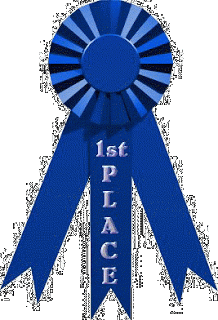 The New Yorker Story of the Year for 2011 is . . .
The New Yorker Story of the Year for 2011 is . . ."Stone Mattress" by Margaret Atwood.
This definitely wasn't my favorite of the year, and I almost didn't include it in the Top Ten (to see the complete list, with links to the commentary and the stories themselves, go here), but it took the top spot by a margin of 3 votes over "Home" by George Saunders. Third place goes to my favorite, "Going for a Beer" by Robert Coover.
Although I don't keep records, I think more votes were cast this year than ever before.
Congratulations to Margaret Atwood!
Published on January 01, 2012 04:41
December 31, 2011
Last Chance: Vote for the New Yorker Story of the Year
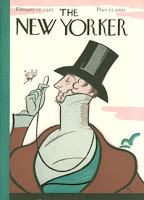 My last post for 2011 is a reminder to vote, if you haven't already, for the New Yorker Story of the Year. Polls close at midnight tonight, Blogger Time. The poll is in the right sidebar. For a full rundown of the Top Ten stories, go here:
My last post for 2011 is a reminder to vote, if you haven't already, for the New Yorker Story of the Year. Polls close at midnight tonight, Blogger Time. The poll is in the right sidebar. For a full rundown of the Top Ten stories, go here:Vote for the New Yorker Story of the Year -- The Top Ten
Published on December 31, 2011 12:53
The Year in Books — the Best of 2011
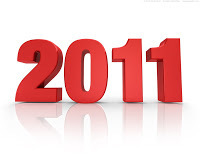
Although I read a lot of books in 2011, I certainly didn'tread all that were published in 2011, and I didn't read exclusively books thatwere published in 2011. So a "Best Of" list is a strange thing to produce.Necessarily, it is a list of the best books I read, not the best books thatwere published. I read pretty widely, too, so I need to break this down intocategories. And to hedge my bets, most categories have runners-up!
Best Novel(published in 2011): Lost Memory of Skinby Russell Banks, reviewed here.
Honorable mention: FamilyFang by Kevin Wilson; and To Be SungUnder Water, by Tom McNeal, reviewed here.
Other 2011 novels I enjoyed: Blood Clay by Valerie Nieman; TheSense of an Ending, by Julian Barnes; OneHundred and One Nights, by Benjamin Buchholz; and Whale Man, by Alan Michael Parker, which I reviewed here.
Best Novel (published prior to 2011): The Lacuna, by Barbara KingsolverHonorable mention: ShanghaiDancing by Brian Castro, reviewed here.
Best Short StoryCollection: Accidental Birds of theCarolinas by Marjorie HudsonHonorable mention: BurningMan by Ed Falco.
Best Young People'sLiterature: Eddie's War by CarolFisher Saller, reviewed here.Honorable mention: Catcher,Caught by Sarah Collins Honenberger.
Best Memoir: Witness by Curtis Smith.Honorable mention: Cagedby Cameron Conaway, reviewed here.
Best Buddhist Book: Confession of a Buddhist Atheist by Stephen BatchelorHonorable Mention: Buddha Standard Time by Lama Surya Das
Best Liberal Book: Aftershock by Robert ReichHonorable Mention: Unequal Protection by Thom Hartmann
I'm looking forward to more good reading in 2012!
[image error]
Published on December 31, 2011 12:04



